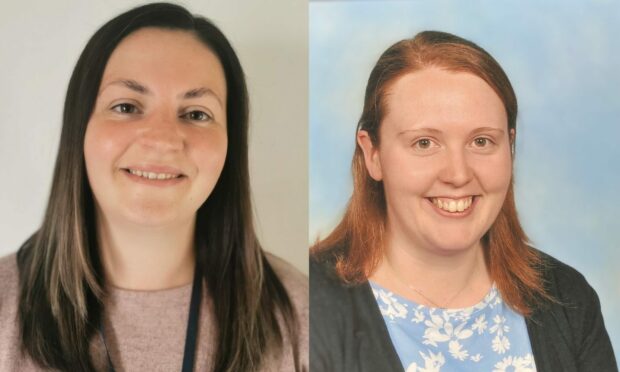The Open University (OU) continues to play a big role in developing the workforce of the future and it has helped many north-east students kick-start their careers.
They include Megan Whyte, now a criminal justice social worker, and teacher Hazel Taylor.
Completing two degrees with the university changed the life of Ms Whyte, from Peterhead, and allowed her to follow her dreams.
Having left school at 16 and worked as an administrative assistant at a supermarket for the next nine years, she started a new job at a homeless hostel and decided she wanted to achieve a better future for herself and her daughters.
First degree in criminology and psychology, followed by postgraduate diploma
She explained: “I have always had a keen interest in criminal justice and wanted to pursue a career within the system. I initially studied for an OU Bachelor of Arts (Honours) criminology and psychology degree to gain further understanding, and increase my employability through the knowledge and skills highlighted on this course.
“During my degree I secured employment with a local criminal justice social work service as a support worker.
“After I completed my first degree studies it felt a natural progression to move onto an OU postgraduate diploma, with the aim of working as a criminal justice social worker.”
Flexible Open University studies fitted in with family life and work
The flexibility offered by the OU was the perfect way for her to study.
She added: “My children were primary school age and I did not feel attending a ‘brick university’ was possible when balancing childcare. I also wanted to continue working during my studies. The OU enabled me to balance work and family life, and fit studying in where it suited me best.”
It was while studying for her postgraduate degree she discovered she was dyslexic.
“One of my previous tutors at the OU had questioned whether I had a dyslexia diagnosis, Ms Whyte said, adding: “She provided me with information on how I could access an assessment. The OU arranged for this assessment and funded it.”
Despite the challenges, Ms Whyte went on to be awarded a first-class undergraduate degree and a distinction in her postgraduate studies. She is now in her dream job.
Meanwhile, Ms Taylor – based in Aberdeen – found the search for professional development opportunities which fitted in with her full-time teaching a challenge.
She discovered the TEachers Learning to Teach languages (TELT) programme through her local authority and was encouraged to enrol on one of the language courses.
French studies with Open University were ‘tres bon’ for Aberdeen teacher
TELT was developed by the OU and Scotland’s National Centre for Languages and is delivered through flexible distance learning.
Ms Taylor chose to study French at post-beginners level, having already studied the language up to GCSE level. She had also previously taken part in an Erasmus course, which involved spending a week in Lyon developing French language skills.
She said: “I wanted to continue personal development but also upskill professionally by learning more about the effective teaching of languages. This course was ideal as it brought the language and pedagogy strands together.”
The OU course fitted well around her full-time teaching role.
She added: “The flexibility within the language study and having materials available in advance meant I could choose to study when I had time available, rather than sticking rigidly to a schedule.
“The tutors were very supportive throughout the course, both in tutorials and by e-mail.
“They provided clarity in terms of course expectations and requirements, and were willing to give one-to-one support if necessary. I particularly enjoyed working with other students on the course, as we were able to share ideas and experiences from the classroom.”
I could choose to study when I had time available, rather than sticking rigidly to a schedule.”
Hazel Taylor
Since undertaking her OU course, Ms Taylor has introduced new ideas in her classroom.
She continued: “Pupils have benefited from my participation in the course, as I have been more adventurous in my planning of languages activities. The children have had a more varied and engaging experience. They have also shared in the successes and struggles that I have experienced, and watched me use strategies to overcome any difficulties.”
Open University boasts 21,000 students throughout Scotland
The Open University in Scotland has delivered high-quality supported distance learning to students for more than 50 years.
With 21,000 students, it is the fourth-largest university north of the border and has students in every part of the country from Shetland to the Scottish Borders.
Susan Stewart, director of the OU in Scotland, said: “The Open University has had strong Scottish roots from the beginning.
“Our founder, the late Jennie Lee, was born in Fife in 1904. At only 23, she was elected as a Scottish independent Labour Party MP and was the youngest member of the House of Commons, at a time when women were not allowed to vote until they were 30.
‘University of the air’
“She was later instrumental in envisaging a ‘university of the air’ where students would learn from home through educational TV, radio and learning materials, setting up the Open University in 1969.
Ms Stewart added: “Our founding ethos is as relevant today as it was then – we are open to people, places, methods and ideas.”
“We promote educational opportunity and social justice by providing high-quality university education to all who wish to realise their ambitions and fulfil their potential.”
This means the university supports students, whatever their age and background, as well as those who for one reason or another don’t follow traditional learner journeys.
Ms Stewart explained: “We have long recognised that people enter higher education at different stages of their lives, and often must balance their studies with work, caring responsibilities or other commitments.
“Many of our new undergraduates join us without the qualifications you would normally need to get into university and the majority study for free with a part-time fee grant.”
Cost-of-living crisis hitting many students in the pocket
The university is seeing the impact of cost-of-living increases on many of its students and Ms Stewart said it was trying its best to support them.
She added: “Supported distance learning which is flexible by design is more relevant than ever. We play a leading role in the delivery of workplace-focused training and work collaboratively with businesses, local authorities, the NHS, the third sector and trade unions to provide skills through multiple programmes driving recovery and growth.
“We target Scottish skills gaps in digital, coding, management and the green economy.”
The university has helped shape Scotland’s future skills agenda. A recent report on the “skills delivery landscape” by former NFU Scotland chief executive James Withers contains many of the arguments the OU put forward in its submission to the inquiry.
Ms Stewart said: “We particularly agree with the recommendation for students ‘undertaking part-time learning or pursuing certain approved accelerated retraining programmes to receive the same pro-rata level of funding support for living costs as those in full time education.
“This would be a welcome removal of a barrier to studying and retraining for many students, and one we have been advocating for some time. In parallel, we strongly advise to consider increasing the part-time fee grant threshold, which has remained the same £25,000 since its introduction a decade ago.”
Some students now earning more than the threshold for fee grants amid inflationary pressures in the UK economy
The UK has recently seen record pay rises, and the OU in Scotland is receiving almost daily calls from students who will have to either pause or stop their studies as their salaries have now breached the threshold and they are no longer eligible for fee grants.
Ms Stewart added: “The Withers Review is one in a myriad of recent reports to Scottish ministers and there is clearly much for the government and the sector to reflect upon.”






